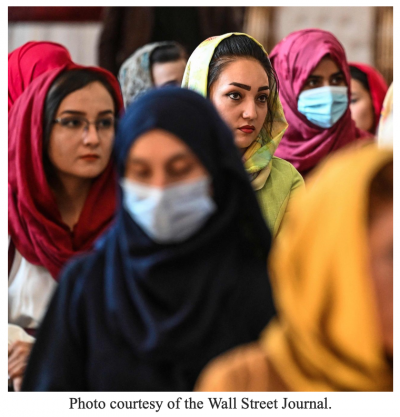
Posted September 20, 2021 by Grace Tobin
"After a failed experiment in nation-building, the United States has left a war-torn Afghanistan."
Human Rights and the Taliban in an America-free Afghanistan: What It Looks Like and Why We Should Care
By: Grace Tobin
September 20, 2021
On August 30, 2021, the United States announced the completion of its withdrawal from Afghanistan after nearly twenty years of military occupation.1 The withdrawal process has prompted serious destabilization in the Middle Eastern country over the past few weeks.2 The Taliban, a religious and political movement and military organization in Afghanistan, overtook the capital of Kabul on August 15, leaving Afghan citizens fearful for their future under Taliban rule. The fear was so great that approximately 640 citizens crammed onto a United States cargo plane departing the tarmac in Kabul.3
But why are Afghans so fearful, and what does the revival of Taliban rule look like for human rights in Afghanistan in this new era of American absence? The Taliban is attempting to portray themselves as more moderate compared to their extreme rule of Afghanistan based on the group’s “harsh interpretation of Islamic law,” which occurred from 1996 until 2000.4 During the previous era of Taliban rule, the militant group “banned television and music, barred women from attending school or working outside the home, and carried out public executions.”5 It is important to note that Islamic culture and the Muslim religion prescribe themselves to traditions and activities which Western countries, such as the United States, may not understand or with which they may not agree.6 These traditions stem from the Quran, the Islamic sacred book. However, the Taliban has historically exaggerated the teachings of the Quran and used the teachings to justify heinous crimes.7 And it’s clear the people of Afghanistan are fearful that history will repeat itself.
President Biden voiced his mistrust of the Taliban and acknowledged that the Taliban will likely have its hands full with ISIS-K, their adversary, in the coming months.8 Members of the United Nations Security Council “passed a resolution pressing the Taliban to continue to allow Afghans to travel, allow humanitarian aid to be distributed, uphold human rights and combat terrorism.”9
The unstable government in Afghanistan and the likely confrontation with ISIS-K may be the least of the Taliban’s problems soon: $9.4 billion in Afghan currency is currently frozen in American reserves.10 To release the money now would allow the Taliban to weaponize against adversarial groups, such as ISIS-K, immediately. But not releasing the funds will likely instigate a currency crisis, halt imports, including food and fuel, starving the Afghan citizens the United States once promised to protect.11
After a failed experiment in nation-building, the United States has left a war-torn Afghanistan. The Taliban’s newfound control is clearly worrying for the elder Afghans who remember what 1996 to 2001 felt like. Between potential food and fuel shortages; women’s ability to preserve their autonomy, attend school, or work outside the home; and the potential revival of extremely violent and public punishment for crimes, Afghanistan is a country on the verge of total collapse. The United States has made twenty years’ worth of political and military decisions which have directly impacted the wellbeing of Afghan citizens. These citizens are risking their lives to flee their country, as seen in the packed cargo plane. These very citizens are collateral damage in American political maneuvers.
- See Nancy A. Youssef & Gordon Lubold, Last U.S. Troops Leave Afghanistan After Nearly 20 Years, Wall St. J. (Aug. 30, 2021, 9:09 PM).
- See John Geddie, Over 600 Afghans cram into U.S. cargo plane in desperate flight from Kabul, Reuters (Aug. 17, 2021, 6:53 AM).
- See id.
- Associated Press, The Taliban Is Celebrating Its Takeover Now That The U.S. Withdrawal Is Complete, NPR (Aug. 30, 2021, 8:11 PM).
- Id.
- Chandra Muzaffar, Islam and the West, PBS: Frontline.
- Id.
- Rebecca Morin, The US is out of Afghanistan. What happens next in the nation now led by the Taliban?, USA Today (Aug. 30, 2021, 7:48 PM).
- Id.
- See Saleha Mohsin, US freezes Afghan central bank’s assets of $9.5bn, Aljazeera (Aug. 18, 2021).
- See id.